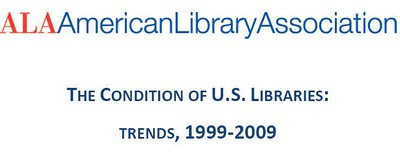Here is an ALA press release about a new report with information on 2009 economic trends in libraries and 2010 outlook:
January 12, 2010
CHICAGO – At every turn, news reports and research indicate fairly dramatic changes in U.S. library funding, services and staffing – most occurring in the last 18 months. According to a new report prepared by the American Library Association (ALA), libraries of all types are feeling the pinch of the economic downturn while managing sky-high use.
Compiled from a broad range of available sources, The Condition of Libraries: 1999-2009 presents U.S. economic trends (2009), and summarizes trends in public, school and academic libraries across several library measures, including expenditures, staffing and services. The report also highlights trends in services provided to libraries by library cooperatives and consortia.
“This report was prepared to inform and assist library leaders as they plan in these very difficult times,” said ALA Executive Director Keith Michael Fiels. “It succinctly brings together diverse strands of data from the past decade to provide a useful benchmark for the library community and its advocates.”
As communities and academic campuses develop future fiscal plans, it is clear that all types of libraries are visibly hard hit. In a fall 2009 report prepared by the Center on Budget and Policy Priorities, 34 states had reported cuts to higher education, which impacts academic libraries; and 25 states had cut funding to K-12, which impacts school libraries. Total state budget shortfalls for fiscal year 2010 are $178 billion, and FY2011 are estimated to be roughly the same.
Public libraries also have been affected. While the full impact of the economic downturn remains fluid and the data challenging to assemble, what is known is that flat funding has been an obstacle – perhaps even a chronic problem - for many libraries this entire decade. Confirming evidence from a 2006 ALA study of public library funding, a 2009 survey conducted as part of the Public Library Funding & Technology Access Study revealed a worsening of funding – about 20 percent reported flat funding continuing in FY2010 and a majority reported budget reductions. Of those with budget cuts, about 20 percent reported 5-to-10 percent reductions in FY2010 from FY2009.
Library trends include:
School Library Media Centers
At a time when school enrollment (K-12) is growing, almost all schools reported in 2009 a decrease in funding for information resources, with a median per-student expenditure of just over $12; and
Fewer school libraries served more students in the 2006-2007 school year compared with the 2002-2003 school year; and
Total SLMC staff grew slightly, then declined in the 2006-2007 school year compared with 1999-2000.
College and University Libraries
While student enrollment at colleges and universities has declined since 2004, library use continues to increase. During a typical week in 2008, academic libraries reported more than 20.3 million visits, up from 18.7 million in 2006. They also provided more than 498,000 informational services to groups attended by more than 8.9 million students and faculty, up from 471,000 sessions attended by 8.3 million in 2006;
In fall 2008, 72 percent of academic libraries reported providing library reference service by e-mail or the Web, about the same as in 2006; and
Operating expenditures rose modestly during the period 2002 to 2008.
Public libraries
Total public library circulation and circulation of children’s materials continue to rise. Circulation of children’s materials has accounted for between 32.9 and 35 percent of total circulation between FY2002 and FY2007. Total circulation of public library materials has grown each year – up to 7.4 items per capita from about 6.8 items in FY2002;
Most public library Internet services have grown between 2006 and 2008, most notably audio and video content; and
Total public library operating expenditures have varied little year-to-year and typically align with inflation rates. Staff account for the largest portion of expenditures, followed by “other” expenditures (technology, utilities, programming, etc.) and collections.
The full report is available at
http://www.ala.org/ala/research/initiatives/Condition_of_Libraries_1999.20.pdf















